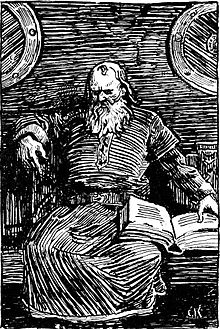Snorri Sturluson
| Snorri Sturluson | |
|---|---|

“Snorri Sturluson” by Christian Krohg (1890s)
|
|
| Born | 1179 , Dalasýsla, Iceland |
| Died |
23 September 1241 (aged 62) Reykholt, Iceland |
| Occupation | Lawspeaker, author, poet, historical, politician |
| Parent(s) | Sturla Þórðarson Guðný Böðvarsdóttir |
Snorri Sturluson (Icelandic pronunciation: [ˈsnɔrɪ ˈstʏrtlʏsɔn]; 1179 – 23 September 1241) was an Icelandic historian, poet, and politician. He was elected twice as lawspeaker at the Icelandic parliament, the Althing. He was the author of the Prose Edda or Younger Edda, which consists of Gylfaginning ("the fooling of Gylfi"), a narrative of Norse mythology, the Skáldskaparmál, a book of poetic language, and the Háttatal, a list of verse forms. He was also the author of the Heimskringla, a history of the Norwegian kings that begins with legendary material in Ynglinga saga and moves through to early medieval Scandinavian history. For stylistic and methodological reasons, Snorri is often taken to be the author of Egil's saga.
As a historian and mythographer, Snorri is remarkable for proposing the hypothesis (in the Prose Edda) that mythological gods begin as human war leaders and kings whose funeral sites develop cults (see euhemerism). As people call upon the dead war leader as they go to battle, or the dead king as they face tribal hardship, they begin to venerate the figure. Eventually, the king or warrior is remembered only as a god. He also proposed that as tribes defeat others, they explain their victory by proposing that their own gods were in battle with the gods of the others.
Snorri Sturluson was born in (commonly translated as Hvamm or Hvammr) into the wealthy and powerful Sturlungar family of the Icelandic Commonwealth, in 1179. His parents were Sturla Þórðarson the elder of Hvammur and his second wife, Guðný Böðvarsdóttir. He had two older brothers, Þórðr Sturluson (b. 1165) and Sighvatr Sturluson (b. 1170), two sisters and many half-siblings.
...
Wikipedia
